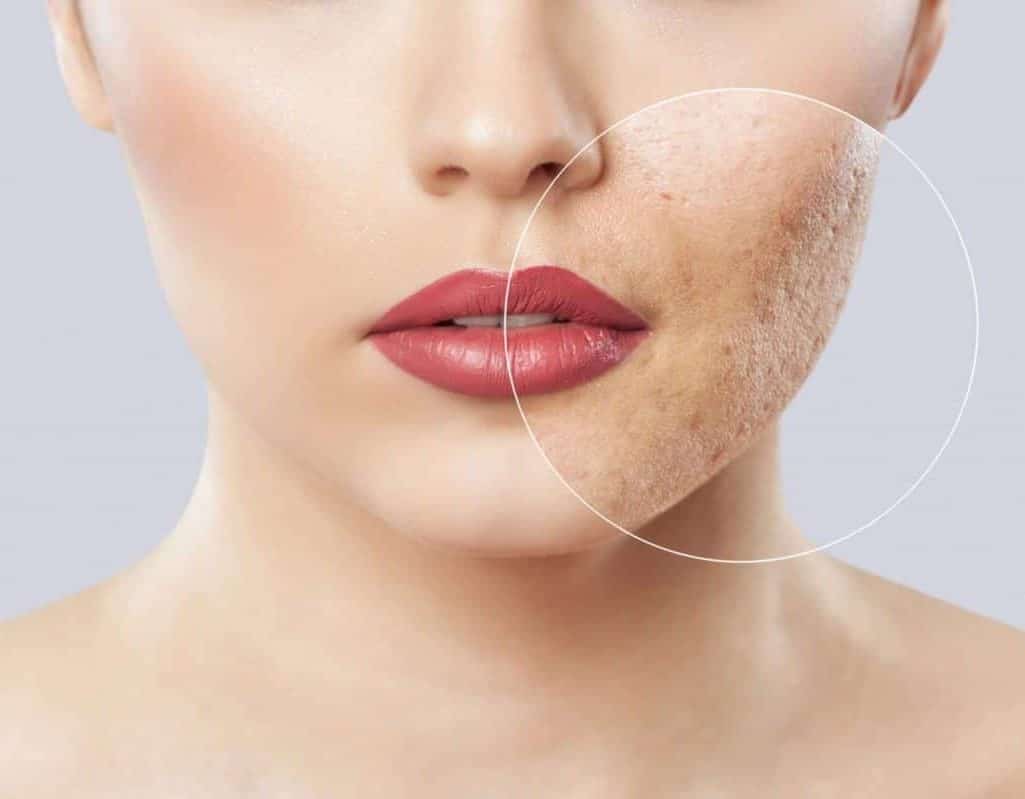Acne scars can range from mild to severe and can have a profound impact on an individual’s self-esteem. Dermatologists today have many tools to help remove or reduce the appearance of such scars. If your acne scars bother you, some of the options you have include:
- Laser skin resurfacing
- Chemical peeling
- Microdermabrasion
- Dermabrasion
What causes acne scarring?
Skin pores become filled with excess oil, dead skin cells, and bacteria. The pore then swells and causes a break in the follicle wall. These types of lesions are usually self-limiting and heal well. Unfortunately, infected material can sometimes spill into surrounding tissue causing a cystic lesion. These types of lesions occur in the deeper tissue and can spread to healthy tissue. Cystic lesions can then result in a scar. Some types of skin are more prone to scarring than others.
Collagen forms to help repair the damage to the skin. The formation of collagen is not always smooth and seamless, and collagen itself is what ultimately leaves the acne scar. The more deep, cystic lesions you have, the more scarring that takes place.
Scarring is one of the many reasons that treating acne is important. Not only does active acne play a role in self-confidence, but the resulting scars can hinder the development of healthy self-esteem. Comprehensive acne treatment should include treating acne, and once it is controlled, removing any resulting scarring.
If you still have active acne, you will want to pursue treatment to control the acne before addressing any scars left behind. Acne is a common problem seen in general dermatology. Treatment options for acne are customized for each patient depending on skin type and the severity of the acne.
Some treatments of acne scars are:
Chemical peels
For this type of treatment, a chemical solution is applied topically. The solution causes the old layer of skin to slough off and allows rejuvenated skin to appear. The cell regeneration serves to unclog pores. This method of treating acne is usually used in combination with other topical treatments to help combat acne.
Injections
These usually consist of corticosteroids injected directly into the cysts or papules of an outbreak. Injections can reduce pain, help the appearance of an outbreak, and help prevent scarring.
Lasers
Lasers that provide light treatment can provide treatment for both active acne and the scars that can be left behind.
Your dermatologist should work with you to tailor a regime specifically for your needs. This regime may consist of a combination of products and therapies.
The type of treatment used for your acne scars will depend on several factors, including how deep the scars are, how many you have, and their overall appearance. Deep, depressed acne scars often benefit from the use of fillers. These fillers, made of collagen, the patient’s own fat, or other approved substances are injected into the depression. The filler acts to plump up the skin inside the scar, leaving a smooth surface.
Resurfacing is best for scars that are not deep. Resurfacing can be accomplished with microdermabrasion, dermabrasion, and lasers, which are used for multiple scars that are not deep. Resurfacing serves to make the edges of the scars less noticeable and to improve the look of the skin on and around the scars.
Needling or micro-needling is a process that is used to encourage more collagen production. This process takes time and usually requires several treatments. Your dermatologist will work with you to establish an appropriate skincare routine while you undergo treatment. Acne treatment, and the scars it can leave behind, should be given a comprehensive approach. The goal should be clear, healthy skin that will last a lifetime.
Once you have achieved control over your acne to prevent future scarring, a plan can be devised to remove or reduce the visibility of any remaining scarring. If your acne is controlled and you experience more than a mild flare-up, contact your dermatologist. You may need to change some form of your established routine to bring the acne back under control.
Your dermatologist should work with you to determine the best treatment method for your acne scars. You do not have to live with the damage that acne can leave behind. If you are tired of trying to hide or disguise your scars, visit your dermatologist to determine which course of action is right for you.

